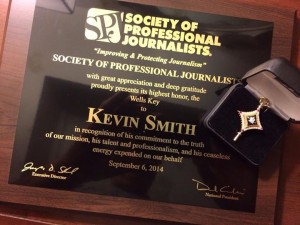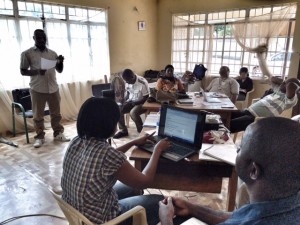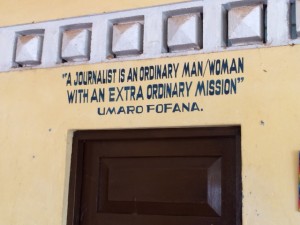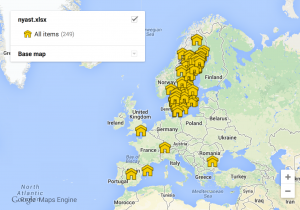Excellence in Journalism 2014 drew more than 1,000 attendees in Nashville. The Kiplinger Program was there, as director Doug Haddix and deputy director Kevin Smith presented their “Digital Dirty Dozen” tools that no journalist should do without. See their presentation.
Uncategorized
Nabbing tweets before they fly away
By DougHaddix
Part of the challenge of Twitter is scooping up relevant tweets before they vanish into the digital abyss. My favorite low-cost tool? TweetArchivist.
The recent national Excellence in Journalism convention in Nashville provided a real-time test of the service. Results have been impressive: more than 8,400 tweets captured and downloaded into an Excel spreadsheet. Plus, TweetArchivist produces eye-catching visuals and charts with key analytics tied to a hashtag.
Here’s how it works: Simply set up an archive by typing in a hashtag, key phrase or Twitter handle that you want to track. Every hour, TweetArchivist updates the search and lassos the results. At any point, you can download the results into a PDF file or an Excel spreadsheet. Online, you can click through various charts and graphics to explore the Twitter conversation.
Pricing is flexible. I chose a one-month plan ($19.99) that allows tracking of up to three archives. That’s ideal for a conference or news event that’s contained to a short time period. A recurring monthly subscription costs $14.99 for three archives; it can be canceled any time.
For journalists, the service could be used effectively to track hashtags on the beat or key sources. During an election season, TweetArchivist could provide an automated way to gather and analyze each candidate’s campaign.
A new offshoot of the service – dubbed TagSleuth – is designed to search four services: Twitter, Instagram, Vine and Tumblr. Subscription plans start at $24.99 monthly.
As a test of TweetArchivist, I set up an archive for the conference hashtag (#EIJ14) and downloaded results a few days after the joint gathering of the Society of Professional Journalists and the Radio Television Digital News Association.
A few highlights:
• Impressions: The 8,418 tweets and retweets with #EIJ14 appeared 22.9 million times on Twitter feeds.
• Top users: Who posted the most tweets and retweets with this hashtag? @EIJ_News (375), @rachelcstella (203), @spj_tweets (194) and @Georgia Dawkins (175).
• Influencers: The tweeters with the largest followings who used the hashtag were @karaswisher (966,601), @NPR (370,069) and @BrianStelter (237,244). Engaging with key influencers can help spread your message or story to an even larger audience.
• User mentions: This measure gives a sense of who created a lot of buzz during a conference or news event. At EIJ14, the top three individuals were @karaswisher (791), @stevebuttry (224) and @atompkins (189).
• Hashtags: Other top hashtags in #EIJ14 tweets included #Ferguson, #Storify and #wearables.
• Source: How tweets were posted can give insights into the audience. For this conference, the top three devices were iPhone (3,368 tweets), Web browser (1,103), Android phone (851) and iPad (835).
Beyond the metrics, the spreadsheet of all 4,550 tweets (excluding retweets) gives me another option: Get highlights, tips and links from sessions that coincided with the ones I saw in person.
Doug Haddix is director of the Kiplinger Program and assistant vice president of Editorial Communications at Ohio State University.
Kiplinger Program’s Kevin Smith receives coveted SPJ Key
On a 90-degree day last July, more than a dozen journalists holed up in an upstairs meeting room at the Ohio State University campus. The air conditioning was cranked but the committee was still sweating it out. Before them was projected the preamble for Society of Professional Journalists code of ethics. It was their job to revise it.
The group, wordsmiths all, spent 90 minutes parsing just 56 words of the prologue; this after a yearlong debate by SPJ members on the nuances of the language.
Spearheading the changes was outgoing SPJ ethics chair Kevin Z. Smith, who also serves as the deputy director of the Kiplinger Program in Public Affairs Journalism. He had spent months piecing together various edits of the new code, orchestrating plans for the meeting, even arranging for a “geographic” food exchange among the committee. But in the sixth hour of revisions, someone broke out the Georgetown cupcakes, St. Louis crumb cake and the chocolate-covered toffee, effectively ruining the exchange. The committee needed a sugar boost and Kevin didn’t protest.
The task at hand was too important. That’s because journalism ethics is eminently important to Kevin, who served for 23 years served on the ethics committee, two terms as its chair. Whatever it took to hammer out this much-needed code revision, he was going to support. This was his baby.
So no one was too surprised — except Kevin himself — when he was awarded the Wells Memorial Key at Excellence in Journalism 2014 conference in Nashville Saturday. The award, named after the second president of Sigma Delta Chi, Chester C. Wells, is the highest honor an SPJ member can receive.
“No one deserved it more,” one tweet read.
Kevin was praised for his commitment to ethics and to journalism in general.
“He knocked on the doors of countless congressmen and officials to push for a federal shield law, spread the Society’s message throughout the world — even staring Ebola in the eye (in Sierra Leone in June) — and somehow got a normally slow-moving vessel to adopt a Code of Ethics overhaul in one year,” wrote Andrew Seaman, the new ethics chair. “Even in that list, I’m forgetting countless other contributions he’s made to the Society, journalism and individuals over the years.”
After that marathon weekend of code revision in July, Kevin wrote about his feelings in Code Words, the SPJ Ethics blog.
“Journalism has changed dramatically in 18 years. Ethics, not so much, but the way we want to address ethical issues needs to be reviewed from time to time or we grow irrelevant to newer generations.”
Winning the Wells Memorial Key, he tweeted after receiving it, was a “stunning end” to the day. But the biggest accomplishment — as people who know him will attest — was that the SPJ delegates overwhelmingly voted in favor of the revised ethics code.
Journalism, and democratic process, had won out again. And that chocolate-covered toffee wasn’t bad, either. Congratulations, Kevin.
Robin Chenoweth is Program Coordinator for the Kiplinger Program.
Journalists left to turn the tide of repression in Sierra Leone
Stanley Banagura Jr. addresses journalists about repealing the criminal libel law.
The question was a fair one.
“What do you see as the future for journalism in Sierra Leone, maybe in the next five years?” radio journalist Matthew Kanu asked as I mopped the sweat from my brow for the umpteenth time that oppressively hot day.
I gave a positive answer to the thousands of people listening in on the five Radio Maria Catholic stations carrying my live interview.
The real question is what will Matthew and other journalists make of their opportunities in this time? It doesn’t matter what I think, if I’m right or wrong. All that matters is what people here, journalists up front, work to accomplish in a country desperately seeking solutions to many obstacles holding back a free press and free speech.
For starters, imagine a law that can not only hold a journalist criminally responsible for an allegedly libelous statement but also hold citizens to those expectations for simply reading or listening to those words. A paper calls the president a rat. The reporter is jailed for libeling him, detained 10 days. You think, too bad for the journalist. That same law applies to any citizen who writes or speaks ill of another. And, if you are one of the many people who are seen reading that rat reference, then you could be arrested and charged with sedition, extending the defamation into the public sphere.
Sound absurd?
The people here think so as well. In fact, the United Nations and the U.S. government have told the Sierra Leone officials time and again that this isn’t an acceptable law in a democracy. They don’t seem to care.
“What if every paper said the same thing and then a large crowd marched to the jail, a thousand strong, and demanded to be jailed for reading something like that?” I asked, trying to make my point for solidarity.
Without a hesitation the response from many in the room was, “They would find space in the jail for a thousand people to prove their point.”
While here I’ve been diplomatic at times but outspoken often. I don’t think journalists should be going to jail for such nonsense. I don’t think any governance that claims to be a democracy should entertain such a law, let alone use it. I don’t think high-ranking government officials or mining companies should own newspapers. I think 63 newspapers in this tiny country are too many. I think too many journalists lack ethical standards, taking “brown envelopes” of money to write or not write certain stories. I think making up sources and facts in a paper and slanting every story for a political party is a terrible way to foster a responsible press. I think all of this and said so as often as I could when I held a microphone.
But it’s not up to me to right these issues. I can advise, and I did a lot of that this week, drawing on my experience in ethics, media law and media association management. I appealed to their ethics, which many have, and I reached them with reason. Matthew Kanu and his colleagues with the Sierra Leone Association of Journalists are strong, principled people who want a better country with a responsible press and the choke of an oppressive government away from its neck.
Five years can be a long time under these conditions. My hope is that Matthew and many like him can make a difference. I know they will try. And, for my continuing part, I will support them any way I can.
Bias, extortion and jail time: Journalism growing pains in Sierra Leone
Kelvin Lewis stood next to me on a particularly hot topical day as I tried to catch a breeze on the porch of the Sierra Leone Association of Journalists’ office.
“The challenges we face, they seem insurmountable,” the association president quietly said. “Don’t you think?”
I paused with my answer for a moment, letting the question carry its full weight into my conscience. I had no positive reply.
“I have to admit, I’ve never experienced anything like this,” I said. “I knew some of the situation before I came here, but it’s worse than that. Where do you start?”
“Exactly,” he replied.
There has to be a starting point if things hope to get better for the media in Sierra Leone. Some would say that the press is well on its way past a starting point, that it has gained momentum and respect in its battle for press rights. But don’t tell that to Kelvin, who manages one of the nation’s papers and is revered here as a stalwart for the press. At times it’s hard for him not to feel defeated.
The U.S. Embassy, which brought me here this week for a series of talks with dozens of journalists, wants the SLAJ to make some headway toward solidifying its position as a primary carrier for the free-press banner. That makes sense. After all, who better to fight for free press than the press itself?
But after six hours in a sun-baked oven of a room with SLAJ members, it was hard to be positive. Every plausible idea designed to make progress seems hopelessly doomed for one overpowering reason: The government of this nation doesn’t want the press to have real rights. Not like the ones we enjoy in the U.S. Not even close. When you can jail a journalist for referring to the president as a rat and face criminal libel charges, you are at a threshold that defies anything attributable to a democracy.
That’s just the start. The government’s argument is that with freedom must come responsibility. It wants journalists to be more ethical. Understood. With 63 papers and many of them gaining birth from political parties or large business interests, it’s easy to see why the government would want to admonish bad, biased, irresponsible reporting.
Except that people in government own some of those same newspapers. Two former ministers of information own papers. So does a current one. A special assistant to the president owns a paper. Just about anyone who is in a position of power or who wants to control political parties has a newspaper. These publications contain what you expect: the very same bad, biased and irresponsible reporting the central government wants regulated by stronger ethical standards.
No one leans on these newspapers. Rather, they lean on the papers that are independent and challenge the government and its corruption.
The problems wind and intersect, but the hub clearly seems to be the government. Kelvin shares a conversation he had recently with Minister of Information Alpha Kanu, who lamented the fact that five years previous, the media environment was much better and there was much more respect and love for the government. The minister wondered what had changed.
Maybe it’s that the press has matured and felt compelled to report on a nation rife with political corruption, from the police officer on the street corner to the highest levels of the central government. In short, journalists have started acting like a press corps. The honeymoon is over.
Today, SLAJ is creating an ethics code to deliver to the Independent Media Commission, a sort of news council that has to power to punish journalists for unethical behavior.
In this nation, if you don’t like what a journalist has written about you, you can file a criminal complaint and the police will investigate. Libel is a criminal offense, meaning fines and jail time. SLAJ is trying to get that law repealed. Motions have been moved through Parliament and there are promises to repeal the law after a three-year wait. First, SLAJ must show the IMC that it will rein in its members with a code of conduct. Once that happens, the IMC will forward its comments to Parliament (which appoints the panelists) and ask lawmakers to consider lifting the criminal libel law.
However, guess which papers routinely run afoul of the IMC policies and standards, but refuse to acknowledge its authority and thereby continue the pattern of irresponsible journalism: The same ones making money for the politicians.
Those aren’t the only problems. Papers here are being held hostage by a cartel of vendors who demand unreasonable profits from the sale of newspapers. Imagine an American publisher giving 50 percent of the sale of a newspaper to its street vendors. The powerful vendor union extorts these high prices and won’t allow non-compliant papers on the streets. Cut the union out and it could get violent. One frightened publisher turns over all of her Friday profits to her newspaper carriers.
I knew the task wouldn’t be easy and maybe that’s why the challenge appealed to me. I know this much, within 48 hours we will have a first step, or maybe a next step. And, just maybe I can remove some of that burden that Kelvin and his colleagues carry.
The greatest joy will come in conquering the insurmountable problem. Trust me, Kelvin.
“You dirty . . . ” and other ways journalists land in jail in Sierra Leone
Street scene in Freetown, Sierra Leone.
In Sierra Leone, calling the country’s president a rat could find you being interviewed by police and court officials as you face criminal libel charges.
By interview I mean detained and interrogated by police. By libel I mean criminal charges, as in jail time and fines as opposed to American civil libel laws that require the element of malice toward public officials.
As difficult as it is to read this, it’s tougher to write after sitting among journalists and government officials today as they recount their versions of this case.
After one day in this West African nation, it’s premature of me to pass judgment on more than a decade of antagonism between the press and the government, but one thing is surfacing – both sides need intervention.
If calling the president a rat is the worst of journalism here, it would be easy to side with the journalists as they hold their elected officials duly accountable. Sadly, the rat comment seems mild compared to other stories I’ve heard and some evidence I’ve seen.
Newspaper stories are often rife with opinion. Sources are questionable at best; anonymous here usually means there is actually no source, rather than a protected one. The papers are sadly politicized to a level even Americans would find offensive.
It’s not out of the realm of possibility that a story could be pure fabrication.
Imagine if calling the president a rat was a comparable offense in the U.S.: Fox News would make for an interesting chain gang with Sean Hannity and crew working the rock piles with sledgehammers.
The government does have a point. Not the one about jailing journalists, or as it was referred to, “interviewing them,” over a weekend, at a police station. (Note: If a journalist writes anything in a paper which someone believes challenges his good name, that offended citizen can file a report with the police, who will investigate, and depending on the power status of the complainant, the investigation can be resolved on a street corner or it could escalate into the weekend interview.)
The government’s good point is that there is a lot of unethical and irresponsible press happening here. A nation that has a long and involved ethics code, as well as an independent media council to resolve disputes, struggles with legitimate journalism that places emphasis on accurate, fair, balanced and reasonably objective reporting.
It doesn’t take long to see which media supports the president’s party and which is against it, which newspaper is owned by a casino and which one belongs to a diamond mining company.
So, angered by the seemingly endless barrage of bad stories that fill many of this nation’s 63 newspapers (population 6 million with an literacy rate just greater than 35 percent), the government reacts and does so at times pretty harshly.
Even government officials admitted to me they don’t want to jail journalists (they didn’t say jail, they always say interview) but, sometimes a message must be sent.
Rat? Really?
Here’s where the journalists are right. If rat is a criminal offense, that does send a message, a real red flag that shows nothing will be tolerated. As one young journalist confided, the government doesn’t like bad news and chokes off the journalists who try to report it. That heavy-handed behavior isn’t acceptable from any government that claims it’s a democracy.
So, the dilemma here is obvious, that both sides need to exercise a lot better judgment. Government officials need to jerk the libel law provisions off the books, and there is some indication they are doing that with a bill that was passed but not implemented . . . yet.
Journalists need better training and more assistance with ethics. Calling the president a rat shouldn’t be a problem, but taking a bribe to call him that isn’t aiding their cause.
Day One is over. Tomorrow is a fresh start, new faces, new issues to mull and another chance to help create change between the two.
I’d be a rat if I came all this way and didn’t give it my best.
An agent of change: Fostering better journalism in Sierra Leone
Sitting alone with my thoughts in Chicago’s O’Hare International Airport, I find myself anticipating the next leg of a journey that will find me in Brussels, Belgium, come morning light.
By day’s end Sunday, I should be laying my head on a pillow in Freetown, Sierra Leone, ending one journey, but really starting another.
Come Tuesday I will have been with the Kiplinger Program in Public Affairs Journalism at The Ohio State University for one year. When I interviewed for this position and talked about ways we might enrich the training of journalists — where we might go and what we’d do to make that happen — it’s safe to say neither director Doug Haddix nor I envisioned me being in Africa on my one-year anniversary.
But sometimes opportunities come to you. This trip on behalf of the U.S. Department of State is one such opportunity. Oddly, it fell into my lap last month while I was in New England for another Kiplinger speaking engagement. I remember sitting in a small café shop in Brattleboro, Vt., reading the email. Would you consider coming to Sierra Leone and working with the embassy to help improve the journalism climate? Who can resist an offer like that?
Since I accepted I’ve been cautioned by several friends and family about keeping my wits about me there, advice too numerous and obvious to share here. Duly noted.
But, as I peer over reports from the State Department and the United Nations, both of which have people routinely working in Sierra Leone on behalf of a free press, I find myself more concerned over the state of affairs for journalism than I do my own health.
To be blunt, it’s a mess.
Journalists are on the take, as in bribes. They make so little money they need to supplement their income. Diamond and gold mining companies have bought up newspapers, radio and TV stations, turning them into corporate mouthpieces. A journalist association meant to temper this apparently is rife with infighting and distrust. A news council set up with government-appointed officials is trying to work toward a more responsible press but accusations of favoritism and politics are common.
And then there is the central government that has jailed more than a dozen journalists last year on charges of criminal libel. They say if the journalists can’t regulate their behavior, the news council must and, if not, the government will step in. There is an 83-page ethics code for journalists and advertising/marketing people. Suffice to say, a lot of the code isn’t being followed. Still, throwing journalists in jail is no way to bolster a democracy that is little more than a decade in the making.
My job, one speech or presentation at a time, is to help mediate these problems. I need to encourage journalists to be more ethical. I need to tell them that basic news stories need verification. Rumor isn’t fact. It’s journalism basics in some cases. I need to talk about news councils, which are mentoring programs because more and more people in these journalism jobs have no formal training. I need to talk to college students and instill some ethical values. I especially need to convince leaders to stop jailing journalists when they offend them in print.
At times, I admit, I’ve characterized this effort as spitting into the ocean: A lone voice trying to undo so many problems. Then, I realize that perhaps the reason I was chosen for this assignment is because they see me as one agent of change, one who can capture minds and touch the professional souls of a few who will take up this struggle and move forward. That is undoubtedly the hope I have and share with U. S. officials. If your voice is strong and committed you can make a difference, even if it touches one person in the room and gives him or her the courage and resolve to make things better. In the end, that’s my job. I can’t live in Sierra Leone and make the changes for them. That’s all on them.
For the next week, speaking as an agent for change, I’ll bring a passionate voice for better journalism and a better democracy for the people. That will be my task.
Kevin Z. Smith is the deputy director of the Kiplinger Program for Public Affairs Journalism and the chairman of the Society of Professional Journalist’s Ethics Committee. He is a former national SPJ president.
Crowdsourcing and using Excel data to make maps — Moa Frygell
2014 Kip Fellow Moa Frygell posted this on her personal blog this week. It details how she used tips from Kip trainer Mandy Jenkins to crowd-source and visualize data using a survey, Microsoft Excel and Google Maps.
Last week I tried out a tool that I’ve been familiar with for some time, but that I never really got around to doing. Skellefteå AIK is a northen swedish hockey team that has been very successful this season and last. They won the Swedish championships last year, and they are probably going to do the same this year. They won the last game in the final series 8 goals to 1 against Färjestad. Game 4 out of 7 is to night.
My collegue in Skellefteå, great hockey reporter Robert Tedestedt, did a piece last week on a kid that lives in Stockholm but who is a big Skellefteå AIK-fan. His dream was to interview the players, and Robert let him do that.
This story got me thinking. There must be plenty of Skellefteå AIK-fans all over the world. People that were born in Skellefteå, but that left for one reason or another, or anyone really who is into hockey and likes their play or a player.
So I created a form that people could fill in details of where they live and what team they support. I shared it on our webpage and in social media. Then I made a map by putting the data from Excel into Google maps. It was really very easy, and fast. The only problem was that too many people wanted to sign up so I lost control over the data collected and published over the weekend. Another problem is that settings in Escenic doesn’t allow us to embed external files. I’m going to talk to Stockholm about that.
Thanks to @mjenkins for inspiring this!
Creating Sharable Content — Andrew Springer
Creating social media that captures people’s attention means tapping into emotion, said Andrew Springer, the senior editor for social media at ABC News who spoke recently to 2014 Kip Fellows via Google Hangouts.
“It doesn’t matter what the emotion is,” he said. “It’s called the ‘Hey, Martha! affect.’ Someone is reading the newspaper, they look up and say, ‘Hey Martha! Look at this!’”
The Columbia University School of Journalism graduate said that journalists’ competition is not just other newspapers or stations, but any company that creates content.
“Nowadays people don’t just read newspapers or turn to Walter Cronkite,” said Springer. “It’s Facebook; it’s Buzzfeed; it’s Twitter. We’re living in the attention economy. You have to capture people’s attention.”
ABC News uses social media to build its brand, Springer said. The news organization has more than 7 million Facebook likes and Twitter followers each. Facebook pulls in 70% of social traffic for ABC News.
Springer cited two types of sharing: Branded sharing, or what ABC News pushes out; and organic sharing, the things that people share on their own.
“To get people to share we want to tap into emotions,” said Springer.
ABC News has a social team that runs media accounts and a social desk that activates during breaking news.
Springer suggested five stories that are “inherently social:”
- Breaking news. Either live news or stories that drive the conversation. “The juror on the (George) Zimmerman trial on Good Morning America got huge hits.”
- Stories that touch the heart. The story of terminally ill baby serving as best man in his parents’ wedding was among the most “liked.”
- Outrage stories: A Washington man accused of blowing up his dog not being charged with animal cruelty.
- “Listicle,” lists created for social media or for content. “22 jobs where men always make more than women.”
- In-depth stories. “Billionaire twins abused like slaves by dad.”
These types of social media posts are not far off what makes a good story or article.
Magazine-style, well-rounded stories and lists that organize big news stories have hundreds to thousands of shares, he said.
“It depends on what your market is, who your audience is and what people want to see . . .” Springer said. “Our audience’s way of consuming news is changing, and we need to keep up with that.”
You have to be preemptive when considering social media coverage, Springer said.
“What can we do from the get-go? When you’re going out to cover stories, think . . . How can I make them social? Not only social, but I can make them mobile?” he said.
About 71 percent of all activity on Facebook is on a mobile device, he said.
Springer suggested a few online tools for journalists:
- Facebook graph search: To verify material, look for victims during breaking news, etc.
- Specific searches in the Facebook search field: “People who graduated from Franklin Regional High School” or “Men who work at Good Morning America,” for example.
- Google Reverse Image results. Use when you have a photo without an ID. Copy the image url, go to images.google.com, paste in the url, search by image. The engine gives its best guess as to who the subject is.
Springer said his goal as social media editor is to put ABC News in people’s heads via Facebook.
“We have to, as companies, keep up with our audiences and where they are going,” he said. “There are angles that you can take and things that you can tap into that get the message across.”
Follow Andrew Springer on Twitter: @springer.




















